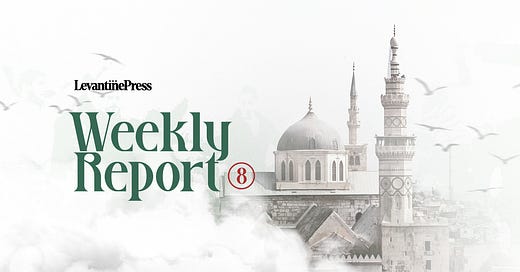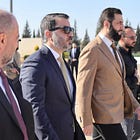Syria Weekly Report #8
Covering events in the first half of February, week beginning 03/02/25: updates on Syria's political transition, economy & infrastructure, foreign policy, and more.
The Latest from Levantine Press
Levantine Press has published three articles in recent weeks providing more colour to the state-building efforts ongoing in Damascus, Syria’s foreign policy blitz, and how the government is learning from the various failures of political reform across the Arab world:
State-building & Political Transition
The National Dialogue finally moves ahead.
With his newly-acquired presidential powers, Al-Shara has appointed a broadly representative preparatory committee of seven individuals tasked with drawing up the mechanisms and identifying the 1200-1500 Syrians drawn from every governorate in Syria to participate in the National Dialogue.
The seven members are: Hassan Al-Daghim, Maher Alloush, Mohammad Mastat, Mustafa Moussa, Yousef Al-Hajer, Huda Al-Atassi, and Hind Qabawat. Two are women (Al-Atassi and Qabawat), one is Christian (Qabawat), one was a former member of HTS (Al-Hajer), two are former members of Idlib’s Syrian Salvation Government (Mastat and Mousa), and two are independents or associated with other factions (Al-Daghim and Alloush).
Syria’s (Anti-Assad) opposition is consolidating under Damascus.
Al-Shara has received delegations from the Syrian National Coalition, the Syrian Interim Government, and the Syrian Negotiation Commission. All bodies have agreed to dissolve themselves and fold into the new government, though the specific details of their future roles (if there are any) are uncertain.
With this, all significant Syrian opposition armed and political factions have submitted to the sovereignty of the government in Damascus, marking another milestone in a stable political transition for Syria.
The coming cabinet reshuffle in March.
In comments made at the Paris conference on February 13th and Munich conference on February 15th, Foreign Minister Al-Shaybani stated that the new transitional government being appointed in March will ‘surprise everyone with its diversity’. They intend to appoint a new cabinet on March 1st.
We have written about how Syria’s new leaders are consolidating power in the ‘chief offices’ of state, and where political participation is likeliest to open for ‘outsiders’ in this incoming government. Our assumption remains that outside of the ministerial seats for intelligence, defence, foreign affairs, and the interior, there will many new changes, particularly in more ‘technocratic’ areas related to the economy.
Ahmad Al-Shara gives an interview with Alastair Campbell and Rory Stewart from ‘The Rest is Politics’ podcast, providing some interesting details on his early life, his perspective on governance, and what he thinks about the future of Syria.
Economy & Infrastructure
A liquidity crisis threatens livelihoods.
The Central Bank’s decision to restrict liquidity with a cap on daily cash withdrawals, and a moratorium on bank accounts suspected of affiliations with the Assad regime, has created artificially enforced scarcity of the Syrian Lira. The reasons for this decision have not been made clear by the bank, with speculation suggesting either a desire to stabilise the economy and temper inflation by controlling the currency, or simply that the bank does not have enough cash in its own vaults. The reason is likely a mix of both. In any case, this has increased the Lira’s value versus the US dollar but also caused a liquidity crisis and price fluctuations as ordinary Syrians struggle to get access to cash and pay for daily necessities.
Turkiye removes import-export controls with Syria.
Syria and Turkiye are making headways in normalising trade. Turkiye has removed import-export controls on Syrian goods and services, subjecting them to the same standards as any other country exporting to Turkiye, and permitting the transport of Syrian goods to third party destinations. This is also a positive step towards reviving the Free Trade Agreement between the two countries negotiated in the late 2000s before its suspension at the onset of the revolution.
Shipping group CMA CGM renews lease on container terminal in Latakia port.
CMA CGM, the world’s third-largest shipping company run by the Franco-Lebanese Saadé family (with patrilineal roots in Latakia), has renewed its lease of the international container terminal in Latakia port with the new Syrian government. This renewal has come with a revision of the previous terms of the lease. CMA first signed a 10-year lease in 2009 with the Assad regime just before the onset of the revolution. This lease gave CMA 99% control over the terminal, with revenues split 38.95% to CMA and 61.05% to the port authority, i.e. the regime. The lease was renewed for a 5-year period in 2019, then for a 30-year period in late 2024, just before the regime fell.
The new government has revised these terms to provide a greater share of revenue to the government, the settlement of any previous debts between the government and CMA, shortening the duration of the lease, and for the CMA to invest in the port’s infrastructure. Exact details have not been provided. CMA has extensive experience in navigating sanctions in shipping, and the Syrian government cannot afford to disrupt operations at Latakia port on short notice owing to economic duress.
Foreign Affairs
Syria leverages a potential relationship with Russia.
Relations between Russia and the new Syrian government have heated up in recent weeks. Russian diplomats have visited Damascus and met with Al-Shara to discuss many issues, likely chief among them the future status of their military bases in Tartus and Khmeymim. On February 13th, Al-Shara was called by Putin who congratulated him on assuming the presidency. Russia is now also calling for sanctions to be removed on Syria. After Putin’s call, Russia transferred around 300 billion Syrian Liras to Damascus (during the war, the regime transferred the printing of the Syrian lira to Moscow), roughly $20-30 million. It is not unlikely that Russian oil and wheat transfers also resume after their suspension after the fall of the regime.
The Syrian government requires the Russia relationship as leverage. The unfortunate position the country has been put in that Syria must deal with one of its butchers so that it can survive because America and Europe have been extremely slow in removing sanctions. Al-Shara likely understood the necessity of leaving this door open as very early on after the fall of the regime he had made statements about wanting to establish an ‘appropriate relationship’ with Russia. The issue of Russian military bases will likely be kept on the table in an ambiguous manner as a negotiating position with the west.
Al-Shara visits Saudi Arabia and Turkiye on his first state-level trips as Syria’s President:
On February 2nd, Al-Shara visited Riyadh on his first trip abroad as President, meeting with Muhammad Bin Salman and performing Umrah.
On February 4th, Al-Shara visited Ankara to meet with President Erdogan, a hugely symbolic moment after thirteen years. High on the agenda was establishing proper trade relations between their two countries, and higher-level security cooperation that could include Turkish bases and air defence systems in Syria. No details of the latter were available.
Al-Shara’s choice of Saudi Arabia for his first state-level visit is part of the emerging strategy of balancing regional interests in Syria, as ensuring Saudi Arabian support is key to the general support of the Arab world.
Foreign Minister Al-Shaybani has toured the UAE and, for the first time, Europe over the past week. The main objective of this diplomacy has been to rally support to lobby against the maintenance of sanctions on Syria which are crippling its ability to rebuild. France’s Macron seems intent on charting a different course for Europe and away from America, demonstrating some geostrategic autonomy by calling for the removal of sanctions. However, Europe is traditionally heavy with words and light with actions, so it is still unclear what the EU course of action is and whether those sanctions will be lifted soon. America has become even colder, with senior US officials not even attending the Paris conference.
On February 11th, Al-Shaybani attended the World Governments Summit in Dubai, UAE, where he also met with delegations from the IMF and World Bank
On February 13th, Al-Shaybani attended the Paris Conference on Syria in France, meeting with President Macron and other French government officials, foreign ministry officials from Jordan, Qatar, Turkiye, and Canada, as well as Syrian business and civil society delegations.
On February 15th, Al-Shaybani attended the Munich Security Conference in Germany.







